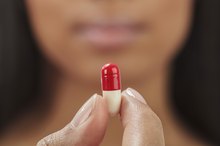A Post Pancreatitis Diet
The pancreas is a small organ tucked behind your stomach in the upper area of your abdomen. The organ facilitates the digestion of protein, fat and carbohydrates by secreting enzymes which, in ordinary circumstances, become active once they reach the small intestine. Additionally, the pancreas produces a hormone called insulin which regulates blood sugar. Since the pancreas is integrally tied to digestive processes, diet is an essential part of post-pancreatitis treatment.
If you are experiencing serious medical symptoms, seek emergency treatment immediately.
About Pancreatitis
Pancreatitis is an inflammation of the pancreas which occurs when digestive enzymes produced by the pancreas begin to eat away at the organ. The causes of pancreatitis vary, but it is most commonly the result of either alcoholism or a gallstone which blocks the pancreatic duct.
Low-Fat Foods
Diets That Help Prevent Pancreatitis & Acid Reflux
Learn More
Individuals recovering from pancreatitis often experience indigestion, weight loss and abdominal pain and may produce oily stools because their pancreas isn't producing enough enzymes to handle digestion properly. A low-fat diet is key to treating the symptoms of malabsorption because it allows the pancreas to rest. Individuals with pancreatitis should keep their fat consumption below 30 grams per day, according to MedlinePlus 3.
Nutrient-Dense Meals
Pancreatitis often leads to weight loss and malnutrition, so it's important to make every meal nutrient-dense. The University of Maryland Medical Center recommends eating frequent, small meals rich in protein and whole-grain carbohydrates 1. Protein should come from lean meat, poultry, fish and beans, while consumption of red meat should be limited. Antioxidants are particularly beneficial for recovery, so berries, tomatoes and vegetables are an important part of post-pancreatitis nutrition. To combat malnutrition, incorporate iron and B-vitamin-rich foods such as whole grains and dark leafy greens in your diet.
- Pancreatitis often leads to weight loss and malnutrition, so it's important to make every meal nutrient-dense.
- Antioxidants are particularly beneficial for recovery, so berries, tomatoes and vegetables are an important part of post-pancreatitis nutrition.
Stimulants and Allergens
A Diet for After Your Gallbladder Has Been Taken Out
Learn More
Avoid stimulants including coffee, alcohol and tobacco which exacerbate the malabsorption problems associated with pancreatitis.
Supplements
Your doctor may recommend a multivitamin and supplements including omega-3 fish oil, coenzyme Q10, vitamin C and probiotics to combat malnutrition. Do not take supplements without your doctor's permission.
Related Articles
References
- University of Maryland Medical Center: Pancreatitis
- Columbia University, Department of Surgery: Pancreas and Nutrition: Your Diet for Pancreatitis
- MedlinePlus: Pancreatitis - Discharge
- Afghani E, Pandol SJ, Shimosegawa T, et al. Acute pancreatitis-progress and challenges: a report on an international symposium. Pancreas. 2015;44(8):1195-210. doi:10.1097/MPA.0000000000000500
- Yadav D, Lowenfels AB. The epidemiology of pancreatitis and pancreatic cancer. Gastroenterology. 2013;144(6):1252-61. doi:10.1053/j.gastro.2013.01.068
- Krishna SG, Kamboj AK, Hart PA, Hinton A, Conwell DL. The changing epidemiology of acute pancreatitis hospitalizations: a decade of trends and the impact of chronic pancreatitis. Pancreas. 2017;46(4):482-488. doi:10.1097/MPA.0000000000000783
- Yoshida S, Okada H, Nakano S, et al. Much caution does no harm! Organophosphate poisoning often causes pancreatitis. J Intensive Care. 2015;3(1):21. doi:10.1186/s40560-015-0088-1
- Afghani E, Pandol SJ, Shimosegawa T. Acute Pancreatitis-Progress and Challenges: A Report on an International Symposium. Pancreas. 2015;44(8):1195–1210. doi:10.1097/MPA.0000000000000500
- Huh JH, Jeon H, Park SM, et al. Diabetes mellitus is associated with mortality in acute pancreatitis. J Clin Gastroenterol. 2018;52(2):178-183. doi:10.1097/MCG.0000000000000783
- Chatila AT, Bilal M, Guturu P. Evaluation and management of acute pancreatitis. World J Clin Cases. 2019;7(9):1006-1020. doi:10.12998/wjcc.v7.i9.1006
- Shah AP, Mourad MM, Bramhall SR. Acute pancreatitis: current perspectives on diagnosis and management. J Inflamm Res. 2018;11:77–85. Published 2018 Mar 9. doi:10.2147/JIR.S135751
- National Pancreas Foundation. Acute pancreatitis causes and symptoms.
- Mandalia A, Wamsteker EJ, DiMagno MJ. Recent advances in understanding and managing acute pancreatitis. F1000Res. 2018;7:F1000 Faculty Rev-959. Published 2018 Jun 28. doi:10.12688/f1000research.14244.2
- Uc A, Andersen DK, Bellin MD. Chronic pancreatitis in the 21st century - research challenges and opportunities: summary of a National Institute of Diabetes and Digestive and Kidney Diseases workshop. Pancreas. 2016;45(10):1365–1375. doi:10.1097/MPA.0000000000000713
- National Pancreas Foundation. Chronic pancreatitis causes and symptoms.
- Lew D, Afghani E, Pandol S. Chronic pancreatitis: current status and challenges for prevention and treatment. Dig Dis Sci. 2017;62(7):1702–1712. doi:10.1007/s10620-017-4602-2
Writer Bio
Carolyn Robbins began writing in 2006. Her work appears on various websites and covers various topics including neuroscience, physiology, nutrition and fitness. Robbins graduated with a bachelor of science degree in biology and theology from Saint Vincent College.









